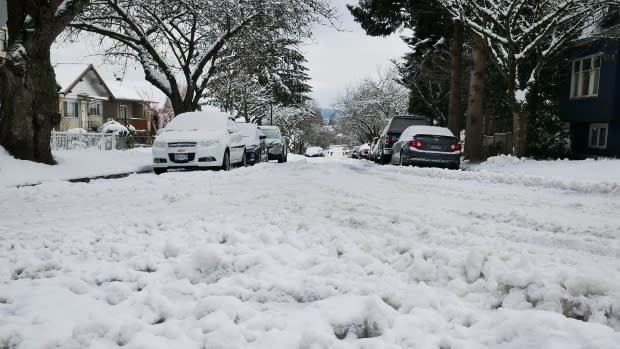The science behind why Vancouver sucks at dealing with snow

We all know Canada isn’t called the ‘Great White North’ for nothing. For many Canadians, shoveling snow has become a winter tradition that rivals hockey and skiing.
However, it doesn’t snow often in Vancouver, which is why the rest of the country usually snickers when the city struggles to deal with even the most modest of snowfalls. But there could be a scientific reason for why it’s harder to manage snow on the west coast.
“Snow on the [west] coast has a whole lot more water in it,” said Norm Parkes, executive director of highways operations for the province of British Columbia.
For example, 10 centimetres of the snow in Metro Vancouver contains about one millimetre of water. Compare that to just 0.2 millimetre of water in the same amount of snow in the interior of the province. That affects friction, which helps hold vehicles on the road. Essentially, water in snow causes roads to become more slippery for motorists.
“It (snow) reacts differently when it hits the roads,” Parkes told Yahoo Canada News.
Meanwhile, snow doesn’t stick as easily to roads in drier climates.
“When the roads are hovering around -10, it feels like you’re sticking more to the roads and the snow tends to powder and blow off,” Parkes said. “It feels a whole lot safer. Whereas, if you’re traveling in a coastal snowstorm, it’s more water and it feels a little more slick when you’re driving.”
Temperatures near zero are the toughest conditions for driving, according to Armel Castellan, a meteorologist with Environment and Climate Change Canada.
“Vancouver is not a continental climate…it’s temperate. We never get those super cold temperatures,” he said.
So while it has been snowing quite a bit in Vancouver recently, temperatures remain for the most part in the -3C to -5C range, and -10C in the city would be a rarity. Very cold air doesn’t hold moisture, but cool coastal air (like in Vancouver) does. Again, moisture = slippery.
Anecdotally, Castellan said even the Prairie dwellers he knows struggle on the roads in Vancouver when it snows.

Then there’s the issue of being inexperienced behind the wheel when the white stuff starts falling. Since the city hardly sees any snow, Vancouver drivers are relatively inexperienced at dealing with winter driving conditions.
“A little bit of experience goes a long way,” Castellan said.
It’s also a matter of having the right equipment. Given that Vancouver can usually go an entire winter without any snow, most drivers don’t have winter tires. And the city isn’t exactly equipped with an army of sand trucks or snowplows.
This winter, Vancouver spent $2.5-million on snow removal in December alone. In comparison, the city usually budgets $750,000 a year for that.
Over the weekend, Vancouver International Airport had a record snowfall of 12 centimetres within 24 hours — that breaks the record set in 1946 of 10.7 centimetres. The Fraser Valley region was hardest hit by the recent snowfall. According to Global News, Chilliwack, B.C., got a staggering 80 centimetres of snow in just three days.
Fortunately, the unusual winter weather is winding down for Vancouver, Castellan said.
“We are going to go back to seasonal norms quite quickly.”
By mid-week, temperatures should begin to climb and by the end of the week, the city will see normal highs in the 6-9C range.


